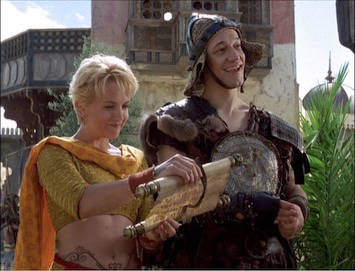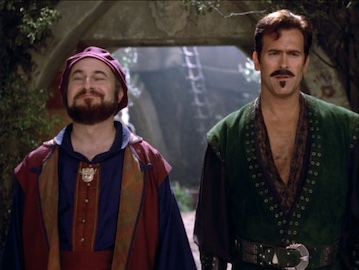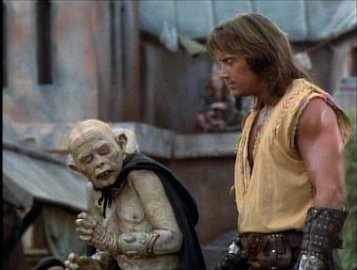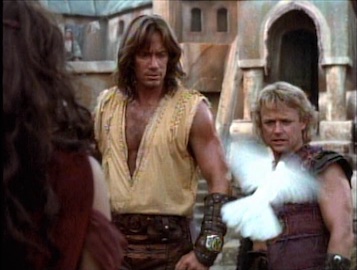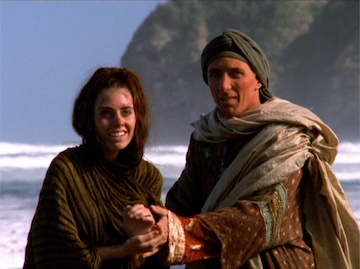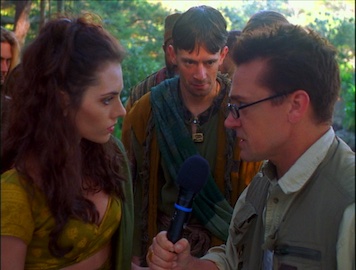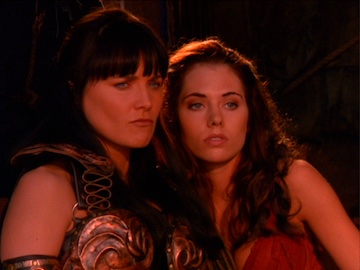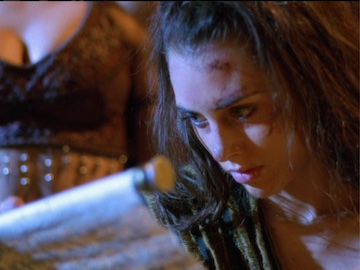
In summing up
Soul Possession,
Xena Warrior Podcast made an intriguing observation: they mentioned that someone pointed out if you arrange the entire series purely in chronological order, it ends with the final shot of
Soul Possession (seen above), with the camera aimed at the C.H.A.K.R.A.M. Institute’s sign off-kilter, and the sound of Joxer breaking wind. That would be typical of an episode that is considered by many to be one of the most hated, if not the most hated, episode of the series.
It sounded promising at first: it billed itself as the episode that would finally tie together all the loose ends of the series, and fans thought they would get answers that would clear up numerous unresolved plot elements. But the actual result was an episode that seemed to mock the very idea of wanting serious resolutions to the show’s plot holes, and even made fun of the fanbase yet again, just a few episodes after Send in the Clones. To not a few it seemed like almost an act of contempt against its most dedicated viewers. At best, it’s considered a well-intentioned bit of unnecessary fan service that went completely out of control.
So what were they thinking when they put this episode together? Especially when they needed all the goodwill they could muster before a series finale that would frustrate many so fans’ expectations? Does this episode deserve the contempt it seems to have deliberately courted?
I think they must have understood what the fan reaction would be, but I think they were focused on something more important. The last half dozen episodes were bidding farewell to the show’s various elements, and perhaps we might think that Send in the Clones should have been the farewell to the comedic “uber” episode (“uber” meaning set in present day, outside the bounds of the show’s concept). It was that, but I think Soul Possession was the farewell to the “satyr play” pattern we see throughout the show, whether uber or no. Satyr play elements can be seen in both uber and regular episodes set in ancient Greece. We can think of this as the Satyr Play to end all Satyr plays.
I would even go further: Rob Tapert had said years later that he seriously considered ending the series with a comedy. We know that Soul Possession was heavily rewritten by director Josh Becker, taking it in a different direction. Could Soul Possession have been originally conceived as the series finale, to take place after A Friend in Need? Was the penultimate episode originally the ultimate episode?
Let’s consider the evidence.
The episode was rewritten by Becker because it wasn’t funny enough, according to him. We also know that the teleplay was credited to Melissa Blake, who had written several scripts for Jack of All Trades, all comedies (and which Becker also played a key role). The general feeling, then is that this was an episode in which show runner R.J. Stewart had very little hand in. No wonder we didn’t get any real answers, one might say. Except: we know that pretty much everyone who wrote a teleplay for Xena had a lot of notes from R.J. to work from, and the teleplay was often rewritten to a certain degree. We also know that Josh Becker usually became involved in episodes where heavy last-minute rewriting was called for. He could always be trusted by Rob and Sam to deliver the sensibility they wanted, namely a kind of satyr-like defiance of the audience’s expectations. If you recall Josh’s old discussion board on his website, you’ll know that going against fan expectations is exactly the thing to expect from him.
So what was R.J.’s original concept, and why was it changed?
I’m not so sure it was substantially changed. I think R.J. had a number of plot points that he wanted to address, in conjunction with Rob wanting certain loose ends addressed, and there may have been an attempt at some point to deal with these seriously…up to a point. I think the story about the scroll being hidden in an undersea cave was always there, and may even have been in mind for quite some time. The idea of a marriage contract between Ares and Xena, I think, was always in the back of R.J.’s mind as well, and would serve good purpose here. The general idea of having a scroll discovered was very likely part of the original idea as well, and that would bring up the whole idea of Xena’s legacy, and who could lay claim to it. Would it be the scholars, the fans, the press, her descendants, her immortal enemies? These are concepts that I think would likely appeal to R.J. Stewart’s sensibility. I think Melissa wrote the teleplay based on these ideas, but the resulting script didn’t have enough satyr-ic punch to it. It needed to distinguish itself from Paul Robert Coyle’s teleplay for Send in the Clones, and Josh was the perfect choice for that.
Why do I believe that R.J. contributed the basic structure for the episode (despite fan theories that he had little to do with it)? I think in addition to this episode being a farewell to satyr plays, it also was a farewell to the Greek play that most influenced R.J.’s approach to writing Xena (by his own testimony): Euripides’ Helen.
Helen
This is a play whose influence can be seen throughout the show: the idea of two Cleopatras in Antony and Cleopatra, for one, and the unconventional portrait of Helen in Beware of Greeks Bearing Gifts. There are even moments that evoke Destiny, and M’Lila’s song to the sea. Euripides’ version of Helen’s story is unique: he depicts her as having been in Egypt during the entire Trojan War, while a double took her place in Troy, unknown to her husband Menelaus, Paris, or anybody else. Helen’s reputation as a loyal wife suffered greatly as a result, according to Euripides. When Menelaus discovers his wife is actually in Egypt, he tries to rejoin her, but finds she is being forced into a marriage with the king of Egypt, enforced by the king’s sister, who has godlike powers. Helen escapes through an elaborate ruse: they convince the king that she can’t remarry until she buries her husband with a ritual, symbolic ceremony at sea. The false Helen, meanwhile, is hidden in a sea cave, and vanishes into mist, revealing her unreal nature. Helen and Menelaus, disguised as a shipwreck survivor, concoct a whole list of ingredients they need for their fictitious ceremony, which the Egyptian king supplies them, and while at sea, they make their escape back to Greece. The king tries to pursue them, but is prevented by the appearance of Helen’s twin demigod brothers, Castor and Polydeuces.
For those not familiar with Greek theater, or Euripides, this kind of wild plot doesn’t seem like something we’d expect from him. It was a quite daring portrayal of women then, and still strikes us as unconventional. There were rumors at the time that Euripides wrote this play for the secretive Women’s Festival, and in fact, Euripides’ contemporary, Aristophanes, wrote a play about how Euripides must have actually snuck into the Women’s Festival as a spy in order to write Helen (the Euripides we see in Athens Academy of Performing Bards isn’t really based on the actual Euripides, but on the satirical version of him portrayed in Aristophanes’ comedy, The Women’s Festival, which quotes a lot from Helen). We can see why R.J. Stewart would single out this play as his chief inspiration, given not only how Euripides portrayed women, but how it experimented with new creative ways of retelling the ancient myths. The scenes above could have been found in any Xena episode, and thanks to Soul Possession, actual plot elements found their way in right in the nick of time, just before the series’ end!
We can see how this play is reflected in Soul Possession: a forced marriage involving godlike powers, the marriage contract hidden in the sea cave, carefully orchestrated deceptions occurring at just the right time and place. We can even see how the list of burial rituals and ingredients is reflected in Soul Possession, when Joxer follows all the pre-nuptial rituals of the bachelor party and the something borrowed, something blue scene.
The Trackers

Grenfell and Hunt at the Oxyrhyncus dig
There’s another Greek play, however, that I believe plays an equally important role in R.J.’s thinking. I’ve mentioned in my post on
Ulysses that only one “satyr” play survives from ancient Greece, Euripides’
The Cyclops, handed down by scribe after scribe for 2400 hundred years. But in the early 20th century, another satyr play was discovered: in 1907, two scholars, Grenfell and Hunt, professional scroll hunters, discovered in an ancient trash heap in Oxyrhyncus, Egypt an incomplete version of Sophocles’
The Trackers. This stunning discovery was announced at the General Meeting of the Egypt Exploration Society by Dr. Hunt to great fanfare. Decades later, in 1988, the play was “completed” by playwright Tony Harrison as
The Trackers of Oxyrhyncus. He added “uber” scenes to the play as a way of expanding its themes to encompass how the play was discovered, and how ancient Greek theater has a surprising way of suddenly becoming relevant to us no matter how many centuries have passed.

Lyre, lyre … Tom Purbeck as Apollo, with James Rigby and Dannie Pye in The Trackers of Oxyrhyncus
Sophocles’ original version of
The Trackers was based on the myth of a youthful Hermes’ invention of the lyre. Apollo believes Hermes had stole his cattle, so he sends a group of satyrs to steal them back (i.e., to track down the cattle). They not only discover the cattle, but hear Hermes playing the world’s first lyre, a sound that mesmerizes them. The play ends there, but we know how the rest of the story goes: Apollo jealously steals the lyre, and punishes the satyrs for daring to play it. Harrison completes the play his own way by having Grenfell and Hunt resurrect the story by combining the scroll pieces of
The Trackers, while digging through the ancient rubbish pile. The satyrs are resurrected as well, a force of chaos wreaking havoc in the modern world, but they’re not nearly as dangerous as Apollo himself, when he’s resurrected. As Harrison portrays him, the god is very much like Ares in
The Xena Scrolls, determined to bring his own idea of order to the modern world, an idea that terrifies the satyrs (and the rest of us):
“I foresee in ages yet to unfold
my statue in temples of marble and gold.
Palaces of culture with gold statues of me
will preside over music and poetry.
Where I’m on the pediment, where I preside,
no creatures with tails will set clog inside.
They tracked down my lyre and now that I’ve thanked ’em
their clogs aren’t allowed in my musical sanctum…”
This sounds very similar to Ares in The Xena Scrolls after his resurrection:
“The world’s become a glorious
place. The weapons more lethal. The people more
hateful. And there’s a new leader: A lot of vision, a lot
of potential. His name is Hitler. With my help, he’s
gonna make a lot of positive changes.”
[The playwright also comments that Hitler had planned a huge statue of Apollo in Berlin to celebrate his idea of cultural purity]
The lyre storyline was very likely the inspiration for Lyre Lyre Hearts on Fire. Both are stories about a fight over a lyre created by a god. The passage below, the “Xena rap,” has a similar feel to rhyming battles in Sophocles’ The Trackers (as reimagined by Harrison):
Draco: “No, I’m the baddest rapper there is,
And you’re the saddest there is, and that’s the way it is.
Xena: You’re just a copycat. That’s where your head is at.
You chase the rhythm from a place you was never at.
Draco: “Ain’t nobody told you that payback’s a mother?!
Xena: Heads up, my brother, ’cause here comes another.
Draco: “It’s time to face the funk blastin’ atcha!
You better give it up ’cause you ain’t gonna match my rhyme!
Xena: Just like old times, when you be trippin’ in your own stuff,
didn’t know what.
Draco: “I’m the number one warlord, king of the horde.
And I’m out to collect my reward.
Xena: Let’s get it on ’cause I’m gettin’ bored.”
Compare this to a typical scene in The Trackers, a back and forth between Apollo, the satyrs and Hermes fighting over the lyre:
Satyr: This crappy little chappy we apprehended
She claims that he’s Zeus-descended.
Apollo: He’ll have to be quizzed this whiz-kid you’ve tracked
And you’ll be rewarded, as per our pact.
This bovver babe, this bovicidal maniac.
I’ll beat him black and blue to get my bulls back.
Hermes: Gerroff my lyre. I made it. It’s mine.
Apollo: But I’m older than you and a lot more divine.
Give me your gadget. Be a good boy!
I could give class to your trivial toy.
Hermes: It’s boring for a baby in his cradle all day.
I’d go proper potty with no lyre to play.
Apollo: Let me have your gadget or you’ll get a good slap.
That papyrus you’re wearing. It’s full of warm crap.
The Trackers was discovered in an ancient trash dump, and jokes on Xena Warrior Princess about the scrolls being used as toilet paper are very likely inspired by Harrison’s adaptation. Scrolls are constantly referred to in this way: Silenus, leader of the satyrs, at one point hands out pieces of the play’s scrolls, saying “Here take this little bit, it’ll come in handy after a shit….” We’ll see this throughout the show, in the comedies, and we’ll even see Sophocles himself as a satyr in The Play’s The Thing. I don’t think it’s a coincidence that in the same episode featuring Sophocles in a comedy, Gabrielle also gets her big break when her play is discovered by an agent when it’s left in the bathroom: “There is so much garbage around but–when I saw your scrolls, well…!” This is exactly how Sophocles’ only surviving comedy was discovered! In that same episode, Joxer says something very satyr-like, when he comments on Gab’s lucky break: “To think that people could be touched by something left in a bathroom!”
Another comedic motif on the show is flatulence, usually associated with Joxer. On Soul Posession, it’s caused by “goat’s milk shakes”. The idea of milkshakes made of goat’s milk is rather odd, especially in an uber set in the modern era, so it’s appearance must signal the influence of the satyrs, specifically The Trackers. It’s fitting, then, that the last sound we hear comes from the goat part of the goatman!
What is the point of all these references? I think it centers the show on what it’s trying to achieve. In The Trackers, old goatman Silenus laments the cautious satyrs of today, fearful of attempting to play the lyre:
“They’re less accommodating the satyrs of today.
They wouldn’t condescend to be in a satyr play.
They’re joined the polis and they’ve learned its ways
but they despise its music and its plays.”
So if all this is was indeed part of Soul Possession’s development, it indicates that it was of fair significance to R.J., at least, and therefore perhaps for Rob too. Maybe this was the comedy he was thinking of ending the series on? The fact that Josh Becker didn’t find the original script that funny tells me it could have been more along the lines of other episodes he directed that were originally intended to make bigger statements, only to be rewritten as slapstick comedies once it was decided to go in a different direction. I am aware that Rob has been critical of this episode, in retrospect. He’s also been critical of Fins, Femmes and Gems, and Kindred Spirits. What do all these episodes have in common? They were directed and rewritten by Josh Becker, who was brought in to refurbish episodes that once had a much bigger and very different role to play on the show. For this reason, I think it would be a mistake to think that Rob’s criticism of these shows is for the same reason as ours. He knows better than we do what the intended version was versus what was eventually done. I think Josh delivered exactly the kind of show Rob expected, which is why he continued to bring him onto the show, and it’s clear from both their accounts he’s been a key influence on Rob’s thinking.
The working title of Soul Possession was “Missing Pieces”, obviously a reference to the tying up of loose ends, but also, I believe, of the pieces of the long lost Sophocles comedy in The Trackers of Oxyrhyncus. The change of the title to Soul Possession reflects the plot point of who will control Xena’s soul, but I think it also reflects the idea we saw in Lyre Lyre Hearts On Fire, with the battle over who will control the lyre. Will Xena’s soul be the property of Ares, the academics, the writers, or the fans who want a season seven by any means necessary? Just like in Lyre Lyre Hearts On Fire, the winner is author of the Xena rap, who finds a way to get out of her unbreakable Apollonian contract.
My guess is that the concept for Missing Pieces was meant to give us a first glimpse of the world of Xena after A Friend in Need, much like Deja Vu All Over Again ended up being a glimpse of hope for fans who watched both Xena and Gabrielle crucified in the penultimate episode of season four. The animating spirit of the satyrs, defiant to the end against the conventional demands of narrative, would thumb their noses at the very idea of an ending for Xena, and prove their point by tearing up the script and scattering it throughout history to the present day. In a way, that’s what Soul Possession already accomplishes, and maybe it was felt that it would be more effective to end the series with Xena in a karmic cliffhanger, if their intention was to follow up with a movie or two. I believe Rob even said at one point that solving the mystery of how to bring Xena back would guarantee audience interest in a movie. But for a variety of reasons, that gamble did not work out at the time. Until that mystery is unlocked in a future movie, or reboot perhaps, we can take solace in the spirit of the satyrs who braved death for a chance to play the lyre of the gods.
